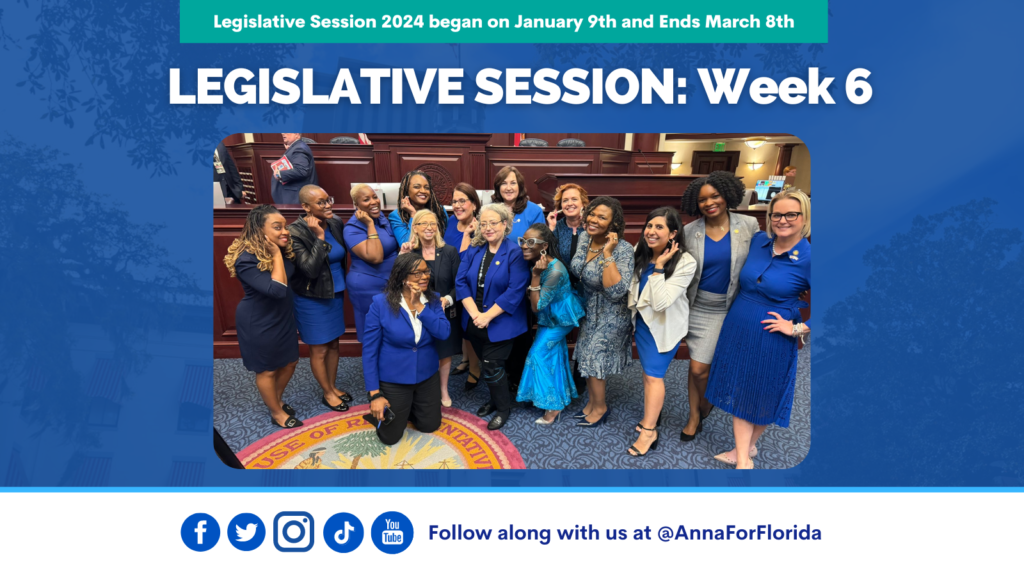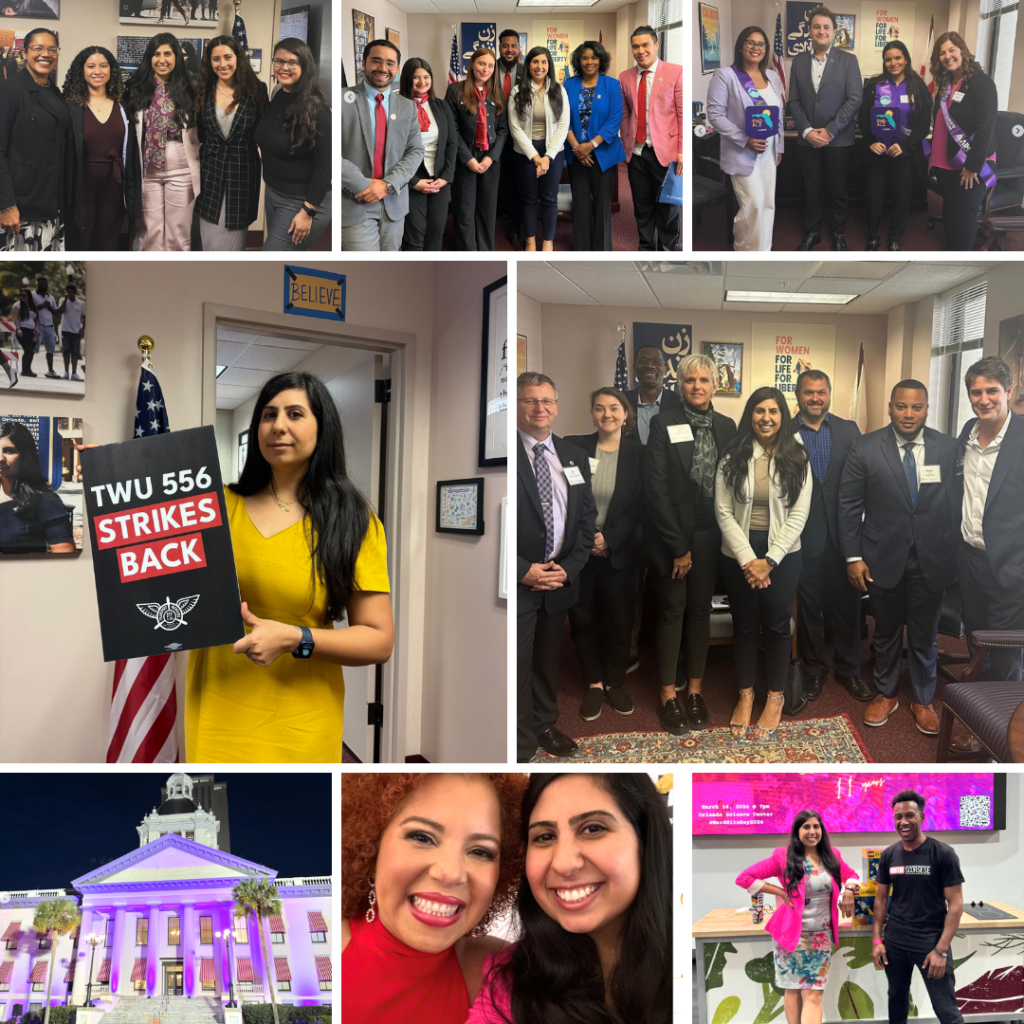Dear Friend,
We’re about to enter the homestretch of the 2024 Legislative Session.
Last week was Week 6 of 9 – which means that session is now two-thirds of the way done. Most committees will hold their final meetings over the next few days. After that, the House and Senate will be in floor sessions nearly every day, passing bills back and forth and on to the governor.
We saw a lot of problematic pieces of legislation move forward last week, including bills to let companies slash wages for workers, protect industrial polluters from accountability, and subsidize the fossil-fuel industry. The state House also rolled out a package of tax breaks that would save lots of money for businesses – but very little for consumers.

You’ll find more information on those issues and many more in our Week 6 update below.
I’m already driving back to Tallahassee for Week 7. If you’re not already, please connect with us on our social media channels for real-time updates. You can find us on Facebook, Twitter, Instagram, and YouTube.
This is the part of session where we often see last-minute sneak attacks on issues like voting rights. So it’s important we all stay on our toes.
But it’s also important to remember that nothing is finished yet – your voice, and your advocacy, can still make a difference.
Onward,
Rep. Eskamani
Tallahassee Republicans launch new sneak attacks on abortion access
Last week, the Florida Representatives voted to spend nearly half a million dollars of taxpayer money developing what I fear will be a dishonest and disingenuous website for pregnant people.
The legislation (House Bill 415) would have the state’s Department of Health contract with a third-party provider to create a “pregnancy and parenting” website. But that website would be allowed to exclude critical information about reproductive healthcare – from contraception to abortion. It would even be allowed to spread abortion disinformation.
We absolutely should provide more information and resources to Floridians who are thinking about becoming pregnant, who are already pregnant or who are new parents. But that information should be accurate and comprehensive.
Republicans revealed their true intentions when they rejected a number of amendments that I and several other Democratic members suggested – including an amendment that would simply have required that all information on this website be medically accurate. Republicans refused to agree even to that.
This isn’t public health. It’s propaganda.
Click here to watch my debate against HB 415, which passed the House by an 83-33 vote. The bill now goes to the Senate.
This is one of several backdoor attacks on abortion access that we’re seeing this session – which, of course, comes a year after Gov. Ron DeSantis and Republican lawmakers passed a six-week abortion ban that could take effect any day, once the Florida Supreme Court issues a ruling on a related law.
Another example is session is Senate Bill 476, which is an attempt to establish a fetal “personhood” law in Florida. The bill would give civil liability rights to embryos and fetuses – which is designed to scare abortion providers out of business by exposing them to more civil lawsuits.
SB 476 passed the Senate Fiscal Policy Committee last week.
The House passes a bill allowing people to shoot black bears
The House of Representatives also passed House Bill 87, which would allow people to shoot and kill Florida black bears if they feel threatened – or if they decide the bear might damage their home.
I’m really concerned about the unintended consequences of this bill, particularly in a densely populated area like central Florida where we have lots of black bears. And black bears are gentle, timid creatures – we were presented with no data whatsoever about dangerous interactions with humans. There are other ways we can reduce potential confrontations, like better securing our trash, that won’t lead to the unnecessary deaths of animals or people.
Click here to watch my debate against HB 87, which passed the House by an 88-29 vote. It now goes to the Senate, too.
Progress on insurance legislation slows
Several major pieces of property insurance legislation were postponed last week. It’s becoming very clear that House and Senate leaders still haven’t agreed on what, if anything, they will do this session to help Floridians who are getting absolutely crushed by rising insurance costs.
A few smaller bills did move forward – including Senate Bill 1106, which would allow Citizens Property Insurance Corp. to sell policies covering more expensive homes; House Bill 293, which would require homeowners’ associations to let individual homeowners make hurricane-protection upgrades; and House Bill 1029, which would expand the state’s My Safe Florida Home hurricane-hardening grant program to condos.
But at this point, it seems very likely that insurance will be one of the very last issues resolved this session.
More bills that just passed the House: Balloon littering, left-lane driving, and Epstein testimony
As we get closer to the end of session, we’re starting to spend more time on the floor. Here are a few more notable bills that passed the entire House of Representatives this week:
- House Bill 321: This bill would expand Florida’s anti-littering laws to include anyone who intentionally releases balloons, which can kill animals that ingest them, like turtles. The bill passed 114-1. I voted yes. The bill hasn’t passed the Senate yet.
- House Bill 317: This bill would prohibit Florida drivers from driving in the left lane of a highway unless they are passing or turning. Police could make traffic stops and issue non-criminal tickets. The bill passed the House 113-3. I voted yes. The bill hasn’t passed the Senate yet.
- House Bill 1285: This bill makes a number of education-related changes, including some problematic ones – like a provision that could weaken the professional standards for teachers hired by “classical” charter schools. The bill passed 84-35. I voted no. The bill hasn’t passed the Senate yet.
- House Bill 117: This bill is meant to ensure the release of the grand jury testimony in the Jeffrey Epstein case. It passed 119-0. I voted yes. The bill hasn’t passed the Senate yet. Read more about it here: Jeffrey Epstein judge holds grand jury transcripts for months. House passes disclosure bill (Palm Beach Post)
- House Bill 7067: This bill would allow prosecutors to have people kept in jail before their trials based on hearsay evidence. It is unconstitutional and passed 84-35. I voted no.
Senate bill would make it harder to record police
The Florida Senate is also starting to spend more time in floor sessions.
One notable bill the Senate passed last week is Senate Bill 184, which would make it a crime to get within 14 feet of a police officer who is arresting or detaining someone after they have been warned to stay back.
The bill passed the Senate 39-0. But there are a lot of criminal legal reform advocates who worry that this legislation would make it much harder for citizens to document abuses of power by police officers.
A House version of this bill has passed all its committees and will likely get a full floor vote soon.
House plan would give lots of tax breaks to businesses – but few to consumers
The House introduced its “tax package” last week – and I’m afraid it’s not a good one.
The package is an assortment of tax cuts and tax breaks that the Legislature passes every year. Last year’s tax package was really good; it included several big, broad-based tax cuts for consumers, including permanently eliminating sales taxes on baby diapers and adult incontinence products, which is an idea I championed for years.
But this year’s tax package (House Bill 7073) does very little for consumers. Instead, it focuses almost entirely on tax cuts for businesses and special-interest favors for corporations like Florida Power & Light.
Because of that, I voted against the tax package in the House Ways & Means Committee, where I serve as the ranking member. But I’m hopeful that we can make it better – and do a lot more to save money for everyday Floridians – before the session ends.
Click here to watch my debate against the tax package.
In addition to more tax breaks for consumers, I’d love to see one other addition to this year’s tax package: Allowing Orange County to charge a “tourist impact tax,” also known as a TIT, to help fund development of affordable housing for the service-sector workers who are the backbone of our local economy.
This is an idea that comes from Orange County Mayor Jerry Demings and a citizen-led Tourist Development Tax advisory committee he convened last year. I proposed it as an amendment to the tax package, although it was rejected. I’m hopeful, though, that that was just the beginning of the discussion.
Click here to watch my presentation of the TIT amendment.
Ron DeSantis finally admits his book bans are an embarrassing failure
Florida Gov. Ron DeSantis’ attempts to ban books and censor educators have been a total disaster. Just last week, we learned that a school in Miami was so wary of running afoul of the governor and his minions that it required parents to sign permission slips allowing their child to listen to the reading of a book by a Black author.
And even DeSantis himself is now acknowledging that his policies have created chaos. The governor last week came out in support of bills in the Legislature that would require people who challenge books in school libraries to pay a $100 processing fee for each challenge if they do not have children in the school.
Unfortunately, the governor and the Legislature still aren’t done trying to politicize and propagandize public education. We saw another example last week, when a House committee approved House Bill 1349, which could require school districts to teach kindergartners – kindergartners! – about communism.
An awful attack on workers keeps moving in the House
I’m disappointed to report that one of the most anti-worker bills we’ve seen in a long time moved forward again last week.
It’s House Bill 433 and it would do three things.
First, it would erase local living wage laws in communities like Miami, Fort Lauderdale, Tampa and Orlando that require companies contracting with local governments to pay their workers higher wages – so those employees can actually afford to live in the communities where they are working. Erasing these ordinances would allow companies to slash wages for tens of thousands of workers around the state.
Second, it would prevent local governments from passing any ordinances compelling businesses to provide their workers with any kind of minimum benefits – from basic health insurance to predictable schedules.
And third, it would block communities from adopting workplace heat-protection standards, which would require companies with employees working outside in extreme heat to provide simple safety precautions like cool drinking water and periodic breaks in the shade. A preemption like this will absolutely lead to the deaths of farmworkers and construction workers, particularly as climate change worsens.
The bill passed the House State Affairs Committee, which is one of the committees I serve on. Click here to watch my debate against it.
We saw several other gross corporate bills keep moving forward last week, too. Here are a few examples:
- House Bill 1289, which would make it even harder for Floridians who lose their jobs through no fault of their own to access unemployment benefits
- House Bill 917, which would allow homebuilders like Lennar to use more 16- and 17-year-old teenagers on construction jobs
- Senate Bill 886, which would give a giant tax break to timeshare owners and timeshare developers
- House Bill 609, which would make it impossible for cities and counties to raise local business taxes
- House Bill 1347 and Senate Bill 1436, which would allow predatory consumer lenders to raise their interest rates even higher
A bill that would protect corporations that pollute our water
I serve on the House Infrastructure Strategies Committee, we heard a really dangerous bill that would protect big industrial polluters from accountability.
The bill is House Bill 789 and it would weaken a longstanding law that imposes strict liability on a company that pollutes our land or water. Strict liability is the highest civil legal standard we can set – and we do that on polluters because our rivers, lakes and drinking water from contamination is so important.
We want companies that produce a lot toxic waste – like Mosaic, the giant phosphate mining and fertilizer manufacturing firm that has tried to weaken this law in the past – to have the maximum financial incentive to be as careful as possible.
HB 789 passed the committee, but I voted against it. Click here to watch my debate against it.
Legislation would eliminate green energy programs – while supporting fossil fuels
One of the big stories of this session is the way Republican leaders have decided to attack green energy and prop up the fossil fuel industry.
Examples of this are Senate Bill 1624 and House Bill 1645. The bills would essentially subsidize the fossil fuel industry in a variety of ways, including wiping out regulations on natural gas infrastructure and making it easier for power companies to pass on gas-related costs to their customers.
But that’s not all. The bills also eliminate green energy programs. The House bill also bans offshore wind energy production. And both bills even erase most references to “climate change” in state law – as if we can pretend our way out of trouble on a planet that is setting new heat records every year.
House Bill 1645 moved through its final House committee last week, which means it’s now ready for a vote in the full House. The Senate bill still has a couple of committees to get through, though.
They’re not the only problematic energy bills moving. Another bill that cleared its last House committee last week is House Bill 1277, which make it more challenging for cities that own municipal electric companies to use funds from their utility to pay for other public services.
This kind of bill is usually pushed by corporate utilities like Florida Power & Light, in hopes that it will pressure more cities to privatize their utilities – which means selling them to companies like FPL.
The Republican Party of Florida proves that it does not care about the property insurance crisis
ICYMI, the Republican Party of Florida revealed its top 10 priorities for this year’s session, and it’s almost entirely made up of idiomatic culture-war campaigns.
What’s on the list? Banning pronouns and pride flags, protecting Confederate statues, giving teenagers guns. Oh, and they want to make gold and silver legal tender, too. (Somebody has been watching too many Fox News commercials.)
But more importantly, what’s not on the list? Property insurance, car insurance, health insurance, or affordable housing. Seriously, there’s not a single mention of any of the real problems that Florida families care about.
Fortunately, Senate President Kathleen Passidomo (R-Naples) threw cold water on many of those same culture-war bills last week.
Read more here: Florida GOP’s culture war platform ignores state’s needs, analysts say (Orlando Sentinel)
More bills to watch: Social media, marijuana, vertiports and more
Here are a few other bills of note that moved through committees last week. Most of these bills are likely headed for full floor votes, soon:
- House Bill 1, which could ban anyone under the age of 16 from having social media accounts. The Senate amended this bill to merge it with House Bill 3, which would ban anyone under 18 from accessing adult websites.
- House Bill 57 and Senate Bill 438, which would subject all county commissioners in Florida to eight-year term limits.
- House Bill 549 and Senate Bill 1222, which would continue on the path of increasing criminal penalties for shoplifters.
- House Bill 981, which would establish rules for vertiports – small areas at airports reserved for electric aircraft that take off vertically. The original version of this bill would have made Orlando the hub for the state’s vertiport-development efforts, but that provision was unfortunately removed from the bill by an amendment.
- House Bill 1071, which would ban the sale of lab-grown meat
- House Bill 1269, which cap THC levels in any marijuana sold for personal use. This bill is designed to get ahead of a proposed marijuana legalization constitutional amendment that is likely to be on the 2024 ballot.
The week in photos

